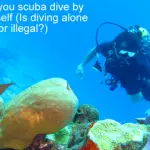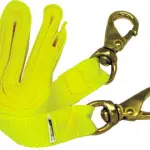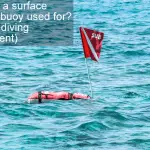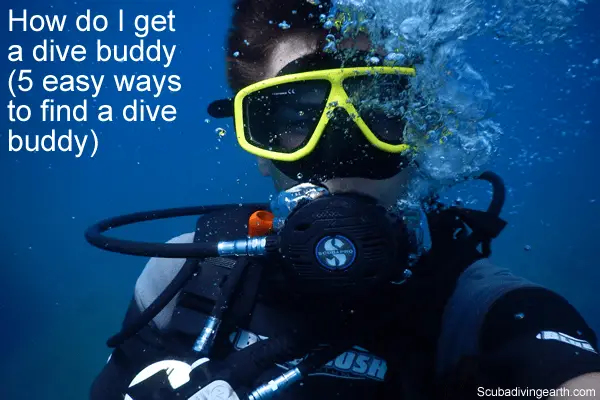
Scuba diving community and buddy diving
If you are wondering about how to get a dive buddy for a dive trip this article explains six easy ways to find a dive buddy.
6 easy ways to find a dive buddy:
- Join a dive club near you.
- Find a Facebook group and join a community.
- Ask your friends and family.
- Book a dive trip on a liveaboard dive boat.
- Go on a dive trip with a dive centre near you.
- Post a message on our scuba diving forum here.
The best way to do more diving and to easily find a dive buddy is to book yourself on a scuba diving liveaboard. You can check the latest and best deals on liveaboards using the following window:
If you don’t have a dive buddy to dive with, let’s look at each method in more detail.
How do I get a dive buddy explained in more detail?
What’s the best way to find a dive buddy to join you on your scuba diving adventures? The six suggested and easy ways to find a diving partner are explained in more detail.
More Reading: 5 best budget dive liveaboards Galapagos Islands (Affordable diving)
1. Join a dive club near you
Being a part of a scuba diving club is great fun and a great way to meet new friends. Dive clubs are very sociable and is how I began my dive career. I joined a local BSAC dive club, but then I live in the UK where this is easy to do.
However, if you live outside of the UK and somewhere like America, you may need to join a PADI dive club instead. You can also join a PADI dive club in the UK and around the world too.
More Reading: PADI vs SSI vs NAUI vs BSAC (Differences & is one certification better?)
Scuba diving clubs associated with all diving organisations are a great way to not just meet a dive buddy, but also to meet a whole bunch of potential dive buddies.
There’s a strong possibility that you’ll find a local dive club right near you. This club will be full of other passionate divers. The great part of dive clubs is their scuba diving community. Also, very often they usually organise regular dives trips too. These dive trips are either in the country where the dive club resides or trips to dive overseas too.
More Reading: Maldives liveaboard single cabin (Maldives diving as a single person)
Benefits of joining a dive club
The benefits of joining a dive club near you include:
- Sense of a scuba diving community.
- A place to share your diving experiences.
- Finding more than one dive buddy to dive with.
- Participating in regular dives both within your country of residence and overseas.
- Other social activities are organised.
- Meeting a new group of like minded people.
- The opportunity to add to your learning and experience.
- It’s likely there will be a dive club near where you live.
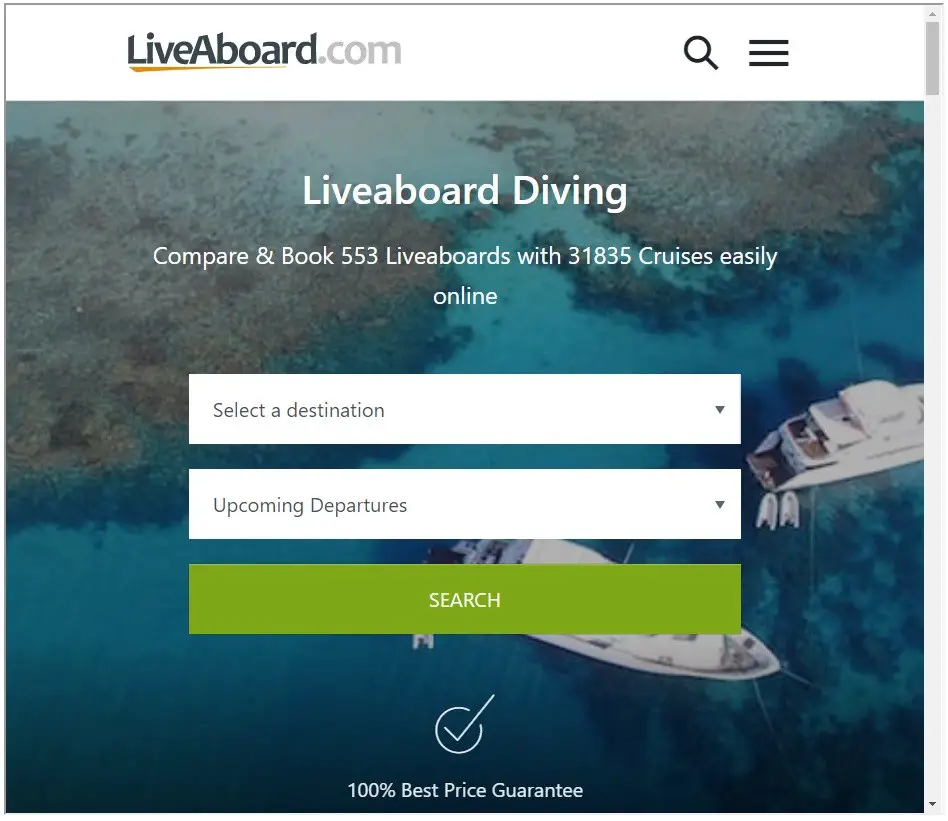
2. Find a Facebook group and join a community
There are many groups on Facebook for all types of sport and hobbies. The same goes for scuba diving too. These Facebook groups allow you to interact with other divers and share experiences with like minded divers.
One such Facebook group which is organised by PAID is the Learn to Dive Facebook group. At the time of writing this article there were nearly 2 million likes of this particular scuba diver Facebook group.
More Reading: Red Sea liveaboard single cabin (Red Sea diving as a single person)
Benefits of joining a Facebook group of divers
The advantages of using a scuba diving Facebook group include the following benefits:
- Free and easy to join wherever you live in the world.
- Possible to find more than one dive buddy.
- You’ll be communicating with like-minded people.
- A place to share your stories and experiences along with your underwater photos and videos.
3. Ask your friends and family
This may sound too obvious, but you never know there may be either friends of family who also scuba dive and would be happy to dive with you.
You never know that your distant uncle or cousin may be a scuba diver. Or you may find that a friend of a friend is a scuba diver and is also devoid of a dive buddy too.
It may also be that you’ll find a family member or a friend who’s interest to learn how to scuba dive, who can then become your dive buddy.
If you don’t ask you may never know and it may well be that your dive buddy is right in front of you, and you never knew.
More Reading: The 9 best budget dive liveaboards Maldives (Cheap Luxury!)
What are the benefits of asking friends or family?
The benefit of asking family and friends include the following:
- Easy and free to do.
- The opportunity to share your hobby with someone that’s close to you.
- It will be easier to trust someone that’s related to you or who has been recommended by a friend.
- An easier route if you’re a shy person and would struggle with option one above.
4. Book to dive on a liveaboard dive boat
One of the best ways in my opinion to find a dive buddy is to book yourself on a liveaboard dive boat trip.
More Reading: What Does Liveaboard Mean? (What Is A Liveaboard Dive Boat?)
More often than not a liveaboard dive boat will include divers only. That means that everyone on board the liveaboard boat will be a scuba diver. Liveaboard dives offer more dives for the money you spend on your diving holiday.
But more importantly, liveaboard diving means you’re with like-minded people who want to dive.
More Reading: 10 Compelling Reasons Why Liveaboard Diving Holidays Are Popular
Liveaboards are great for both beginner scuba divers, as well as experienced divers too.
If you are interested in booking a liveaboard dive trip, you can either click on the above menu ‘Scuba Travel’ above, or alternatively, visit Liveaboard.com to find the best deals on offer to almost anywhere in the world!
More Reading: The best luxury liveaboard diving Raja Ampat (9 Luxury dive liveaboards)
The benefits of liveaboard diving to meet a dive buddy
These are the benefits of diving on a liveaboard boat to find a dive buddy:
- A sense of diving community.
- Space to share your diving experiences.
- An opportunity to greatly improve your diving skills and experiences, as liveaboards offer more diving that resort diving vacations.
- The opportunity to find more than just one dive buddy.
- A chance to meet a life partner too.
- The opportunity to travel to other countries.
- The chance to dive in remote dive locations.
- More chances to do night diving.
- Great for beginner scuba divers to gain diving experience.
More Reading: What to pack for a liveaboard dive trip (Liveaboard essentials)
5. Go on a dive trip with a PADI Dive Centre near you
If you don’t like the idea of joining a dive club, as in option one above, the next best thing is to book yourself onto a dive trip with a dive centre near you.
It’s very likely that you’ll have a local PADI Dive centre near to where you live.
To find a local PADI Dive Centre – Follow this link.
Your local PADI Dive Centre will offer dive trips that you can join. You’ll be buddied up with other divers and enjoy local dive sites.
You’ll meet other like-minded people and enjoy diving with new dive buddies.
Advantages of finding a dive buddy using a PADI Dive Centre
The following are the advantages of using a PADI Dive Centre to find a scuba diving buddy near you:
- The chance to find more than one dive buddy.
- The opportunity to participate in dives near to where you live.
- It’s likely there’ll be a PADI Dive Centre near to where you live.
- The chance to meet new like-minded people.
- You usually only pay for the dives you participate in.
6. Post a message on our scuba diving forum
As a part of Scuba Diving Earth, we have a scuba diving forum too. We thought it would be a great idea to open up a new forum for solo or single divers to reach out to other solo divers for a travel and dive buddy.
Please post your details here: Solo diver forum.
When you post your buddy request, make sure to include the following information:
- Where you live. I don’t mean to post your home address for obvious reasons, but at least say your town or city.
- Where you hope to dive. Explain where you’re hoping to go diving. Is it locally near to where you live or going on a dive trip overseas?
- Your gender. Let others know whether you’re male or female and your preference for whether you prefer a same-sex buddy or if you’re happy for either. Bear in mind if you intend to go on a liveaboard trip that you may end up sharing a cabin.
- Your age. It’s a good idea to match with a dive buddy of similar age so you have similar interests akin to your age group.
- Your diver certification level and experience. You want to match as far as possible your experience and certification level so you’ll be able to dive similar dives together.
- Diving preferences. Explain the type of diving you like to do, be it warm water diving, wreck diving, technical diving etc.
Do you have to dive with a buddy?
The question that many ask is “do you have to dive with a buddy?” Whilst technically it’s possible to dive alone. Plus there’s no law saying that you can’t dive without a buddy. Plus let’s put it this way, there are no scuba diving police to stop you from diving alone!
More Reading: Can you scuba dive by yourself (Is diving alone safe or illegal?)
I am aware that some people do dive alone, but this isn’t something I would do myself and I would certainly not recommend it to any scuba diver.
When you’re getting your scuba diving certification, one of the most important scuba safety rules is to never dive alone.
More Reading: 10 Top Safety Tips For Scuba Diving (Making Scuba Safe)
Whether you learn to dive with BSAC or PADI or with any other scuba organisation for that matter, they all teach the buddy system of diving.
“BSAC recommends that you dive with a buddy. Buddy diving means that divers operate as a unit, with each diver taking some responsibility for the safety of the other(s).”
BSAC – Buddy Diving Rules
Buddy diving is safe diving and you each can rely on the other should something go wrong underwater on the dive.
It might be your or your buddy’s air supply runs out, your scuba equipment may fail or one of you may encounter a problem that requires assistance to get back to the surface.
Whatever the situation, having a buddy is key to diving safely and enjoying your diving.
Buddy diving isn’t only about safety though. Diving with another person makes diving that much more enjoyable. You have two pairs of eyes to spot things and you can share in the enjoyment of finding things on the dive.
More Reading: Diving Buddy Check Acronym or Mnemonic (Why Scuba Buddy Checking Is Important)
I hope you enjoyed this article about how do I get a dive buddy
I’d love to hear from you. Tell us about your adventures of diving and snorkeling, in the comments below. Please also share your photos. Either from your underwater cameras or videos from your waterproof Gopro’s!
If this article hasn’t answered all of your questions. If you have more questions either about snorkeling or scuba diving (or specifically about how do I get a dive buddy), please comment below with your questions.
There will also be many more articles about scuba diving (and snorkeling) for you to read and learn about these fabulous sports.
Have fun and be safe!

